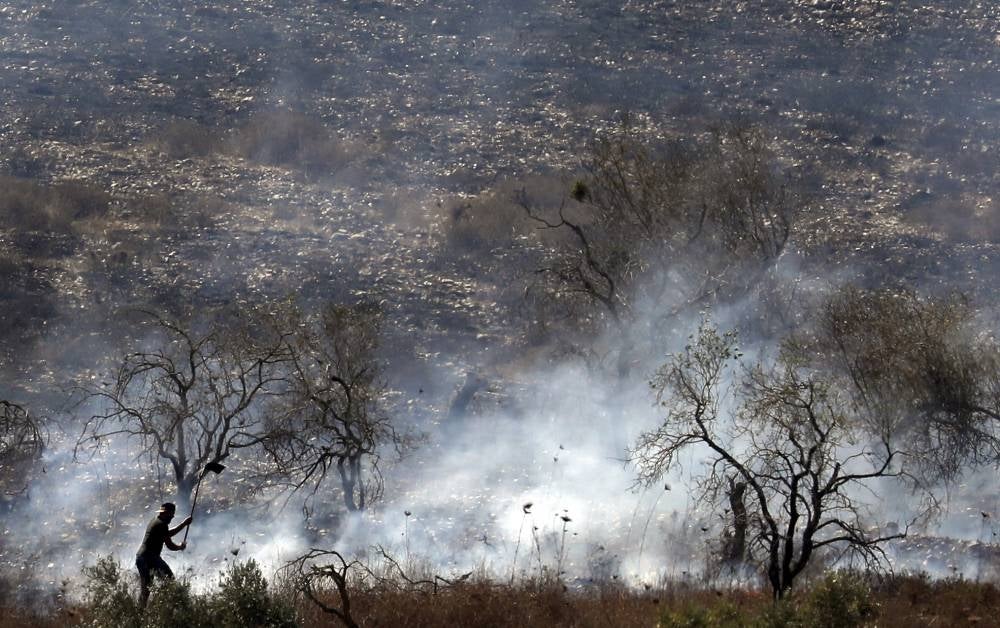Why do olive trees matter to Palestine?

SHAH ALAM – Aside from being bombed and shot at by the Israel Defence Forces (IDF), Palestinians in the West Bank also feel the heat as their olive trees are burnt, uprooted and they are not allowed to access their farmland and crops.
The months of October and November were actually when olives were harvested and held a special significance for Palestinians, who considered the harvest a national occasion that celebrated their relationship and connection with the land.
Usually, farmers would pick olives with their extended families and friends with folk songs being played in the background.
It was a festive atmosphere, but instead, this year, all they could hear were the sound of airstrikes, screaming and shootings.
Now, why do olive trees matter to Palestine?
For many West Bank Palestinians, the olive tree was both a revered cultural emblem and an economic necessity - but it has also become a focal point of a struggle between them and Israeli settlers for a land they both claim.
The olive trees were not like any other trees, but they represented Palestinian resistance and resilience and their attachment to their land – with Palestine housing some of the world's oldest olive trees, dating back to 4,000 years.
The average lifespan of an olive tree was 300 to 600 years but some could live up to 3,000 years.
The draught-resistant plants could grow under poor soil conditions, which made them a vital crop for many communities' survival, especially in a nation where almost one-third of the population faces food insecurity.
In addition to their symbolic meaning, olives were also a main source of income for around 80,000 Palestinian families and they accounted for 70 per cent of fruit production in Palestine and contributed about 14 per cent to the Palestinian economy.
Palestinian farmers faced several challenges in maintaining their olive trees before they were harvested, including the need for permits from Israeli authorities to access their land and tend to their trees.
Hence, during the Israeli occupation, the destruction of Palestinian olive trees was a significant threat to the Palestinian economy and livelihoods.
Dangerous farming
News portal Al Jazeera reported that despite farmers being unable to access their lands at the moment, this had happened even before Oct 7.
The olive-picking season, it said, had increasingly been marred by violence with Israeli settlers attacking Palestinians on their lands, stealing their olives and setting fire to their groves.
A Palestinian olive farmer Bilal Saleh was shot dead by a settler in October while harvesting his crop near Nablus.
In the Gaza Strip, the challenges came from the Israeli military, which either targeted and bombed farmland during times of war or sprayed it with pesticides, killing crops and rendering the soil unsuitable for farming.
Near the southern city of Khan Younis, the agricultural lands span an area of more than 4,000 hectares (9,884 acres) and lie east of the city around towns near the Israeli border fence: Khuza’a, Abasan al-Kabira, Abasan al-Jadida and Bani Suhaila. There are 7,000 farms in the Khan Younis governorate, according to the Agriculture Ministry in the Gaza Strip.
In an interview with Al Jazeera, Ahmed Abu Rjeila, 40, said he was accustomed to dodging bullets.
“I used to go to my land in Abasan al-Jadida with my three brothers despite the dangers that we faced every day from the Israeli occupation, who would shoot at us in order to leave.
“I have hundreds of olive trees and my family and friends were supposed to pick them and sell them in the market or press them in olive mill machines,” he said, adding that the risk was too high to pick the olives at the moment.
Meanwhile, United States leftist magazine Jacobin reported that in the West Bank, the IDF banned Palestinian farmers from reaching their land and groups of settlers burned the farmers’ crops.
In an interview with farmer Omar Ghoneym on Oct 30, he said that he drove from al-Khader to his lands in the southern area of Bethlehem when he received unfathomable news that most of his property (mainly olive trees) had been uprooted and destroyed by settlers.
This war was not only taking place in Gaza. After the attacks on Oct 7, the West Bank has experienced the deadliest weeks since the Second Intifada.
As of this Tuesday, over 140 Palestinians in the West Bank have been killed, 2,040 people have been arrested and villages and cities have been placed under a blockade which prevented residents from traveling outside their towns.
But with Israel’s latest war on Gaza, which began on Oct 7 after the Hamas operation on southern Israel, farmers have been forced away from their land and homes and the ever-present risks that they already faced because of their proximity to the border with Israel have multiplied dramatically.












